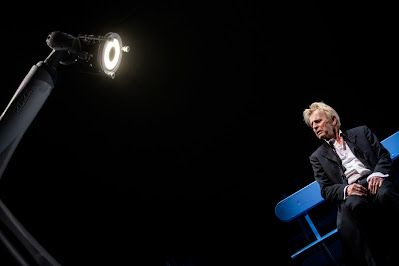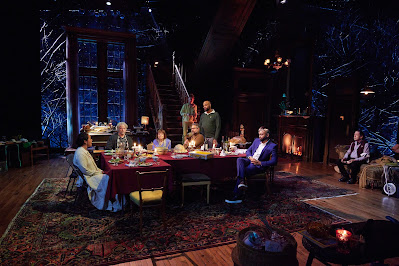The Orchard (c) Maria Baranova
Theater Review: The Orchard
Baryshnikov Arts Center and Online (Closing on Sunday)
Both times I watched Igor Golyak’s reimagined version of Chekov’s “The Cherry Orchard,” now shortened to “The Orchard” – once in person and one virtually – I kept being reminded of the production of another Chekhov play, “Uncle Vanya,” at the center of Ryusuke Hamaguchi’s Oscar-winning film “Drive My Car” in which the theme of human communication is embodied by actors who speak in different languages to each other. “The Orchard” does this but also adds an element of sci-fi with a huge, mechanical, futuristic arm in the middle of the set and an adorable robotic dog scurrying throughout the play. Most of the characters speak in English, including the owner of the soon-to-be-auctioned-off orchard, Madame Ranevskaya (Jessica Hecht) and her two daughters, her brother and a beloved but too-old-to-do-much-good servant Firs (Mikhail Baryshnikov). However, a student named Trofimov (John McGinty) speaks in American Sign Language, while an imposing passerby (Ilia Volok) who terrorizes the family at one point only speaks Russian. Some of this is translated on the scrim that separates the audience from the action, but a lot is not, including some other languages used, like French. The dominant color of Anna Fedorova’s set is turquoise, which is a bold and striking choice, but like the robots and the language heard but untranslated, I could not figure out the reasoning for these artistic touches, especially in relations to Chekhov’s original themes of “The Cherry Orchard.”
The Orchard (c) Maria Baranova
Hecht and Baryshnikov are the standouts in this commendable cast, maybe because they also play a larger part in the online version, which replaces the first 15 minutes of the live play (as well as a couple of moments throughout) with an interactive tour of the Baryshnikov Arts Center, where the play is being performed. The conceit is that the online viewers are the people who are bidding to buy the orchard. What the online audience is missing on stage is a lovely, almost Charlie Chaplin-like performance by Baryshnikov as Firs as he tries to get the estate ready for the family’s return. Instead, the people at home get a tour led by Anton Chekov himself (again played by Baryshnikov) and depending on which room you choose to explore, you may get a lot of Russian dialogue in Baryshnikov’s dulcet tones like I did. When the online audience joins the play, it is mostly shot by a camera from the theater audience’s point of view. But occasionally, you can choose to watch it from the camera located on the robotic arm, which really gives the home audience a unique bird’s eye view of what’s happening on stage. Speaking of birds, Jessica Hecht stays in character as Ranevskaya to answer questions exclusively for the online audience about the orchard, and I cheekily asked if there are seagulls on the property. Instead of acknowledging my reference to another Chekov play, Hecht smiled and then gave a fairly straightforward answer: Yes, occasionally there are seagulls among the many other birds on the estate. One point for you, Madame Ranevskaya.
The Orchard (c) Maria Baranova
The production, presented by Boston’s Arlekin Players Theatre, is certainly ambitious and daring, which is evident in whichever format you choose to see it. How much you connect to the play may depend on your knowledge of the original as well as your tolerance for this kind of avant-garde approach, which gives you a lot to chew on, but very little of nutritional value.
Corsicana (c) Julieta Cervantes
Theater Review: Corsicana
Playwrights Horizons
When the great actress Deirdre O’Connell won her Tony Award earlier this month for her astonishing performance in the one-woman play, “Dana H.,” she said she hopes theater continues to make weird art. That she was already in previews for Will Arbery’s new play “Corsicana” gives her statement some context. While I wouldn’t call “Corsicana” weird, it is challenging to audience members who are expecting a traditional, well-made play. There are many moments in which characters are proned to long monologues that feel tangential to the main plot of two adult siblings dealing with the death of their mother. The main focal point of the set is a sofa in the dead mother’s house, which sometimes rotates around the stage to give way to another sofa that looks exactly the same as the sofa it replaced. And I have seen many of director Sam Gold’s other productions – I don’t think he has ever directed an actor to do or say anything faster. Everything is languid in his hands, and sometimes it works and sometimes it’s excruciating. Or, some may say, weird.
Corsicana (c) Julieta Cervantes
I was totally on this play’s wavelength, which not only deals with the siblings–the stymied filmmaker Christopher (Will Dagger) and his half-sister Ginny (Jamie Brewer)–but also a family friend Justice (O’Connell) as well as the reclusive and socially awkward artist Lot (Harold Surratt). That Ginny has Down Syndrome (as does the actress) may have been the center of most other plays, Arbery treats it as just one of the many challenges these four characters have to deal with. His dialogue here feels natural and halting as much as the dialogue in his Pulitzer-Prize nominated play “Heroes of the Fourth Turning” was hyperbolic and academic, both in tune with each of the play’s characters. All the actors are superlative here, with the unexpected stand out being Dagger who is playing the Arbery stand-in, as the playwright has stated the play is partly based on his relationship with his own sister. Unfortunately, the play sort of loses its way in the middle of the second act as the plot gets sidelined by those aforementioned monologues. But by the end, “Corsicana,” named for the Texas town the characters live in, recovers nicely in a (dare I say it) weird way. This is not an easy play, but I found it quite rewarding.
Epiphany (c) Jeremy Daniel





